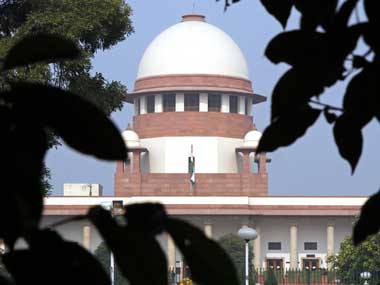New Delhi: The Supreme Court judgement that struck down the National Judicial Appointments Commission (NJAC) meant to put a new system of appointment of judges to higher judiciary in place, had some very important observations regarding the collegium system.[caption id=“attachment_2989648” align=“alignleft” width=“380”]  Supreme Court of India. Reuters[/caption] According to The New Indian Express, Justice Kurian Joseph, who seconded Justice J Chelameswar scathing criticism of the collegium system noted that the “present collegium system lacks transparency, accountability and objectivity.” Stressing how trust deficit has affected the credibility of the collegium system and how “quite often, very serious allegations and many a time not unfounded too, have been raised that its approach has been highly subjective.” The New Indian Express reported that asking for a “deep introspection as to whether the institutional trusteeship has kept up the expectations of the framers of the Constitution” Justice Joseph wrote in his judgment that that “collegium system needs to be improved requiring a ‘glasnost’ and a ‘perestroika’". While NJAC act was struck down by the apex court, it was, nevertheless, seen as an opportunity of reforming the current system of appointment of judges to higher judiciary, which has faced severe criticism for its lack of transparency. But the tussle that ensued between judiciary and executive over the Memorandum of Procedure (MoP), which would guide appointments to the higher judiciary, has dashed all hopes of amicable reform. Now with the reports of apex court judge Justice Chelameswar deciding not to participate in the collegium meetings, the crisis is deepening. According to the report published in The Hindu, Justice J Chelameswar has communicated to the Chief Justice of India TS Thakur, his “disinclination to participate in the powerful Supreme Court collegium meetings”. Mincing no words Justice Chelameswar had criticised collegium in his judgment. Justice Chelameswar who was the lone dissenting judge in NJAC case observed, “Transparency is an aspect of rationality. The need for transparency is more in the case of appointment process. Proceedings of the collegium were absolutely opaque and inaccessible both to public and history, barring occasional leaks.” He had also talked about the desirability of allowing representatives from civil society in the appointment process. Justice Joseph, who also felt the need of transparency, observed that the allegations of lack of transparency and opaque functioning of the collegiums “certainly call for a deep introspection as to whether the institutional trusteeship has kept up the expectations of the framers of the Constitution.” But in a ray of hope, Justice Joseph called it “a curable situation yet.” While there is no denying that the present system can be reformed and can be ‘cured’ of its deficiency, it is only possible when there is acceptance of the problem. According to The New Indian Express report Justice Chelameswar has asked the Supreme Court collegium for recording the “minutes of the confidential meetings held to discuss appointments and transfers of judges. If accepted this would be a big reform”. Till now the functioning of the collegium has been marred with several controversies, with allegations of nepotism and undeserving appointments being the most prominent one. Many constitutional experts feel that the power of appointment should solely rest with judiciary, essential for judicial independence. However, at the same time they agree that collegium needs to be reformed to make it more transparent and accountable. Through three cases (between 1981 and 1998), a new system of the appointment of judges, called ‘collegium’, came into place. In 1981, the Supreme Court declared that the “primacy” of the CJI’s recommendation to the president can be refused for “cogent reasons”. The judgment also stated that the word ‘consultation’ was not to be taken to ‘concurrence’. This tilted the balance of power in favour of the executive, which got primacy over the judiciary in judicial appointments for the next 12 years. However, in 1993 in the ‘second judges case’ the apex court while reversing its 1981 judgment changed the meaning of the word ‘consultation’ to imply ‘concurrence’. It ruled that the advice tendered by the CJI is binding on the president. However, the same judgment also made it mandatory for the CJI to consult two of his senior-most judges while making the recommendations, paving the way for the collegium system. Later in 1998, the apex court ruled that the consultation process to be adopted by the CJI required consultation of “plurality of judges” and the sole opinion of the CJI did not constitute consultation process and he should consult collegium of four senior-most judges of the Supreme Court. If any two judges dissent, the CJI should not refer the name for appointment. Through the last two cases, the Supreme Court in some way democratised the appointment procedure by allowing a voice of dissent, but at the same time monopolised the power of appointment in its own hand. With Justice Chelameswar raising this issue once again, it is a moment for the judiciary to bring transparency in its appointment process. Needless to say, it will be a reform that judiciary needs in order to “preserve” itself.
While there is no denying that the present system can be reformed and can be ‘cured’ of its deficiency, it is only possible when there is acceptance of the problem.
Advertisement
End of Article


)

)
)
)
)
)
)
)
)



